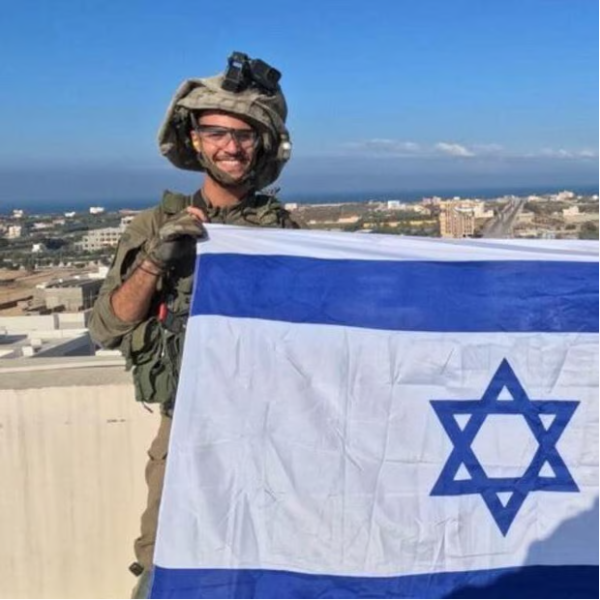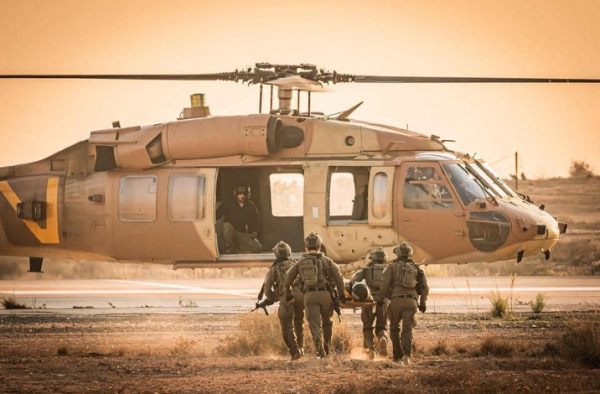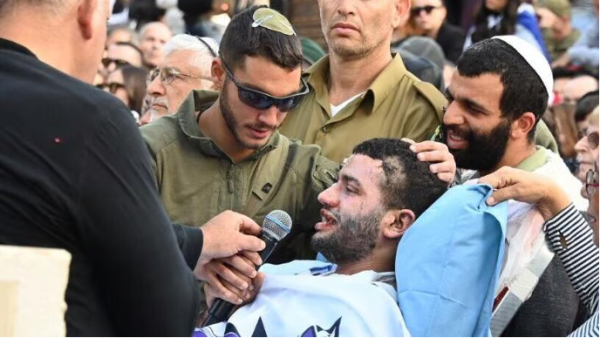By Leah Garber
“I have 1200 reasons to get up from my hospital bed and to rejoin the fighting again.”
— Lieutenant Sahar Nisanov
On the morning of the Hamas surprise attack, Lieutenant Sahar Nisanov put on his uniform even before receiving the official order to report to his unit and left his house on a kibbutz near the border with Gaza.
Six of his soldiers were killed, and Sahar was seriously injured, but after a month’s recovery, he returned to fight inside Gaza: “The question of ‘why go back’ is stronger than the fear. I hope to see children in the playgrounds in the rebuilt kibbutzim soon. This will be success.”

Since October 7, approximately 1,200 people have been killed, including 509 IDF soldiers and officers. Five thousand civilians and soldiers have been injured.
Every morning Israelis wake up with heavy hearts, fearing what will appear in the day’s headlines. Will today, yet again, bring names of more soldiers killed in combat for whom we will shed tears, or will we breathe a sigh of relief in a day without casualties? It is a sad and strange Israeli ritual that has become part of our daily lives.
The figures that are not published daily, however, are those of wounded soldiers.
Much has been written about the bereavement and pain of the many families of those who have been killed and the ongoing suffering of the hostages still in Gaza. The thousands who have been injured are the invisible victims of this terrible war. They risked their lives in battle and were wounded, and we mustn’t forget them.
Some of them suffered injuries that, after a period of recovery, allowed them to return to combat. Others are dealing with serious injuries that have endangered their lives Their loved ones and friends won’t leave them for a moment, and the medical staff treats them like their own children. Nonetheless, they are far from the spotlight as war heroes.

One of them is Tsuki, my own nephew. Tsuki’s fourth son was born two weeks before the war began. Like everyone else, Tsuki left his family and enlisted as a company commander. He served until he was injured by shrapnel that penetrated his lung a few weeks ago in Gaza. Initially, his injury was defined as “serious;” currently he is recovering and awaiting lung surgery. It is clear to him that as soon as he recovers, he will return to fight alongside his friends.
In one of the videos we received before he was injured, Tsuki and his subordinates are seen lighting a large menorah and blessing the candles in the center of Khan Yunis. The menorah’s light illuminated the dark sky of Gaza but not enough to protect him and so many others from enemy fire.
Eight years ago, Major Jonathan Armoni lost his cousin, Naama Henkin, who was murdered with her husband in a terror attack. The next year, he lost his older brother, an officer in the artillery corps who was killed during his military service. In 2019, Jonathan was elected as the President’s Outstanding Officer, an honor bestowed upon very few soldiers. Yesterday he was seriously injured in the fighting in the center of the Gaza Strip. Before he was put into an induced coma, Jonathan managed to say one thing to the doctors: “I am a bereaved brother, take care of me for the sake of my parents.” Since then, he has been sedated and on a ventilator.
Among the thousands who accompanied the late Captain Harel Itach, a team commander in the Givatay Patrol, to his final resting place were the soldiers he commanded in the Gaza Strip. Like their commander, they were injured in an explosion as they searched for tunnels in Khan Yunis, so they arrived in wheelchairs and hospital beds. Yonatan, one of Harel’s subordinates, arrived in his hospital bed to pay his respects:
When I woke up, I couldn’t remember anything from the explosion, but I didn’t have a single regret either. When you shouted to us, ‘Follow me,’ we all did as one. I swear, if you asked me again today to follow you, I will. I will go wherever you go.”
 Since the beginning of the war, more than 2,000 members of the IDF have been disabled. More than 58% of the wounded suffered severe injuries, including limb amputations; about 12% suffered internal injuries, such as damage to internal organs; and approximately 7% are mentally impaired, a number that will increase significantly because post-traumatic stress disorder (PTSD) and other mental injuries usually are diagnosed months and even years after a war. An arduous, years-long journey awaits each one of them: Learn to walk on one leg, function with one hand, and live with a severe disability that requires continuous physical and mental strength and endless treatment.
Since the beginning of the war, more than 2,000 members of the IDF have been disabled. More than 58% of the wounded suffered severe injuries, including limb amputations; about 12% suffered internal injuries, such as damage to internal organs; and approximately 7% are mentally impaired, a number that will increase significantly because post-traumatic stress disorder (PTSD) and other mental injuries usually are diagnosed months and even years after a war. An arduous, years-long journey awaits each one of them: Learn to walk on one leg, function with one hand, and live with a severe disability that requires continuous physical and mental strength and endless treatment.
War is a terrible thing. It has no beauty. But out of the bloody battles and the darkness of the cold, steel war machine and the blaze of the fighting fire, we see the strength of the warriors’ commitment, the greatness of their human spirit.
I was born and raised in Israel, and I am incredibly grateful for my great fortune to be a part of this wonderful nation. Since October 7, my love, appreciation, and admiration for Israeli soldiers have only grown and deepened. They have been fighting for 90 days, risking their lives daily without hesitation. They understand that the world changed on October 7, that Israel is no longer the same country it was, and that what happened on that fateful day must not happen again. To ensure that outcome, they are willing to sacrifice their lives. How can you not love them? How can you not be filled with infinite pride for what our sons and daughters grew to become?
In my prayers, I wish for all the wounded to recover, not to rush to return to the battlefield but instead to return home to the life they left behind. I pray for fathers to play soccer with their children, to hug their partners, to take evening walks in the sunset, and to live.
Tomorrow evening, we will light Shabbat candles for the 13th time since the war broke out. Before reciting kiddish, we will sing “Shalom Aleichem,” inviting the angels of peace to bless us all.
The Shalva Band, which comprises musicians who have physical and developmental disabilities, released a new version of “Shalom Aleichem.” I urge you to listen to this beautifully moving performance and join a long human chain of Jews all over the world who will ask for the blessing of peace from angels above.
Together, united, we will overcome.
Leah Garber is a senior vice president of JCC Association of North America and director of its Center for Israel Engagement in Jerusalem.